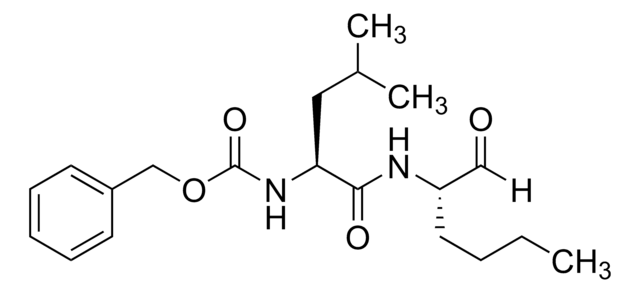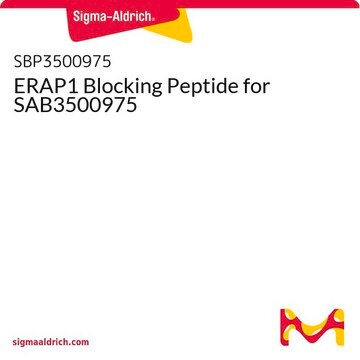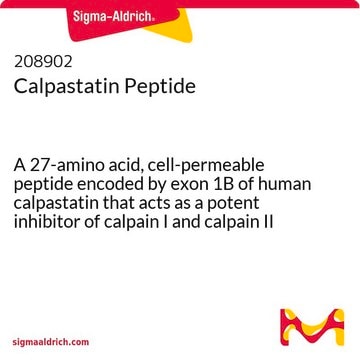11086090001
Roche
Calpain Inhibitor I
N-Acetyl-Leu-Leu-norleucinal, synthetic
Synonyme(s) :
Calpain Inhibitor I, n-acetyl-leu-leu-norleucinal, ALLN, Ac-LLnL-CHO, MG-101, N-Acetyl-L-leucyl-L-leucyl-L-norleucinal, N-Acetyl-Leu-Leu-Norleu-al
About This Item
Produits recommandés
Niveau de qualité
Pureté
98% (chromatographically homogeneous)
Forme
powder
Poids mol.
Mr = 383.5
Conditionnement
pkg of 25 mg
Fabricant/nom de marque
Roche
Pf
182 °C
Solubilité
DMF: 10 mg/mL
ethanol: 10 mg/mL
methanol: 10 mg/mL
Température de stockage
2-8°C
Chaîne SMILES
[H]C(=O)[C@H](CCCC)NC(=O)[C@H](CC(C)C)NC(=O)[C@H](CC(C)C)NC(C)=O
InChI
1S/C20H37N3O4/c1-7-8-9-16(12-24)22-19(26)18(11-14(4)5)23-20(27)17(10-13(2)3)21-15(6)25/h12-14,16-18H,7-11H2,1-6H3,(H,21,25)(H,22,26)(H,23,27)/t16-,17-,18-/m0/s1
Clé InChI
FMYKJLXRRQTBOR-BZSNNMDCSA-N
Vous recherchez des produits similaires ? Visite Guide de comparaison des produits
Catégories apparentées
Description générale
Spécificité
Application
Calpain Inhibitor I is used for western blotting methods.
Qualité
Variante de formule
Notes préparatoires
The suggested starting concentration is 17 μg/ml. This is the concentration at which half maximal inhibition of calpain I is observed.
Working solution: Recommended solvent is DMF, ethanol, or methanol up to 10 mg/ml.
Storage conditions (working solution): -15 to -25 °C
Solutions in DMF, methanol, ethanol are stable for 4 weeks at -15 to -25 °C.
Reconstitution
Autres remarques
Code de la classe de stockage
11 - Combustible Solids
Classe de danger pour l'eau (WGK)
WGK 2
Point d'éclair (°F)
Not applicable
Point d'éclair (°C)
Not applicable
Certificats d'analyse (COA)
Recherchez un Certificats d'analyse (COA) en saisissant le numéro de lot du produit. Les numéros de lot figurent sur l'étiquette du produit après les mots "Lot" ou "Batch".
Déjà en possession de ce produit ?
Retrouvez la documentation relative aux produits que vous avez récemment achetés dans la Bibliothèque de documents.
Les clients ont également consulté
Notre équipe de scientifiques dispose d'une expérience dans tous les secteurs de la recherche, notamment en sciences de la vie, science des matériaux, synthèse chimique, chromatographie, analyse et dans de nombreux autres domaines..
Contacter notre Service technique














